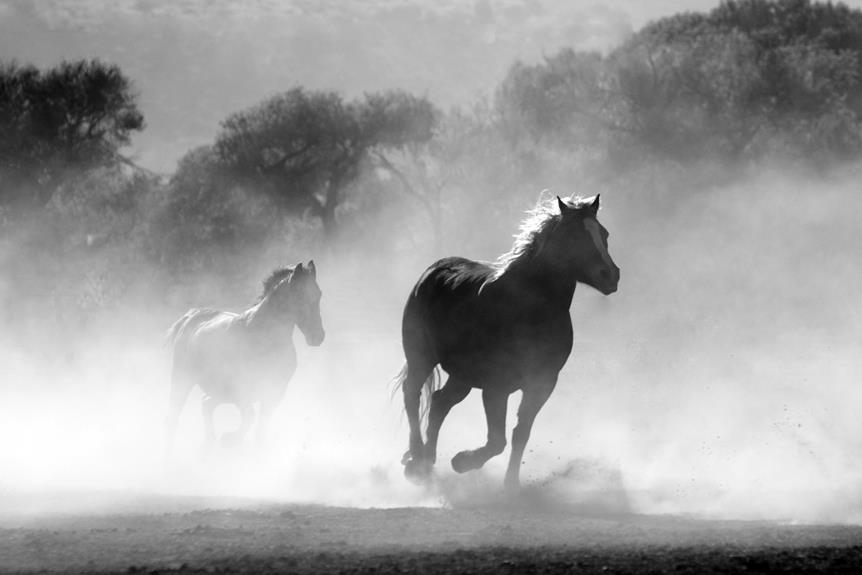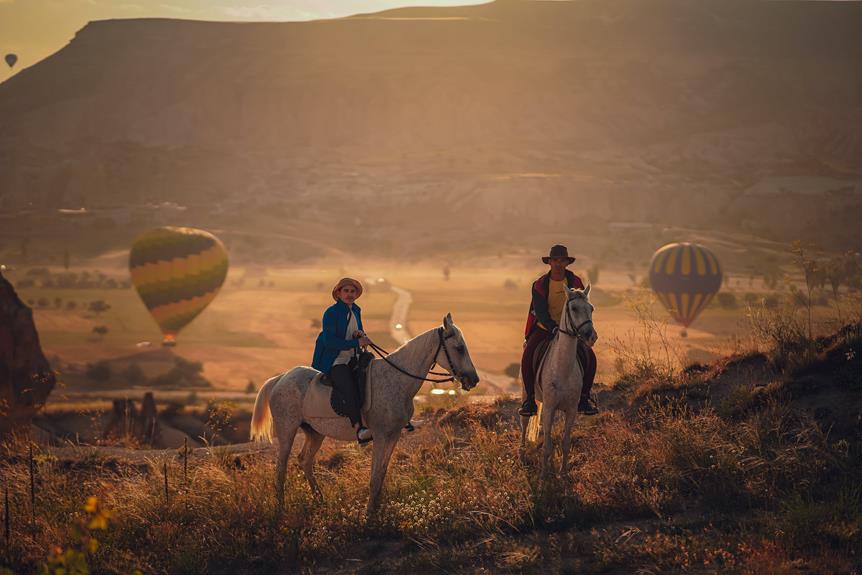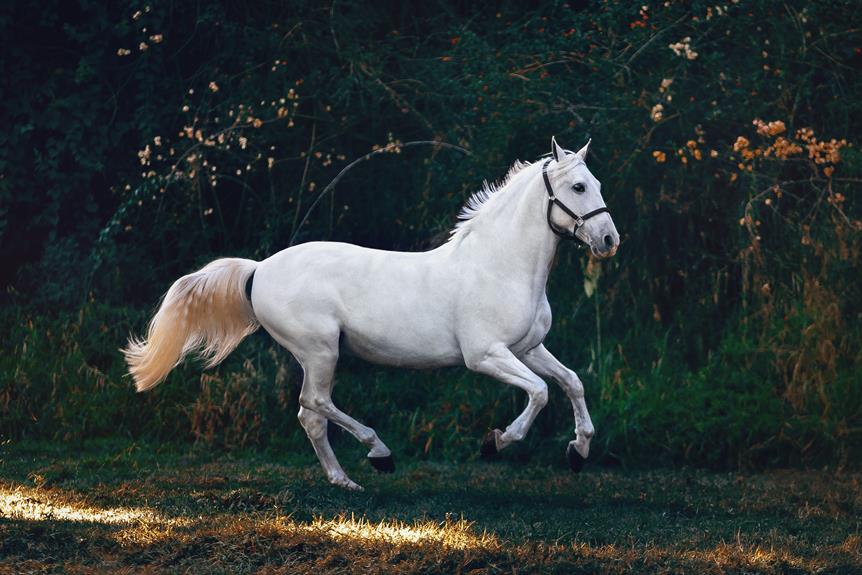Gallop into the realm of symbolism and explore the enigmatic essence of a horse.
As you embark on this journey, you will delve into the intricate tapestry of historical significance, cultural interpretations, and spiritual meanings that have woven themselves around this majestic creature.
From the sun-kissed plains to the moonlit shores, horses have emerged as mediators between heaven and earth, embodying power, freedom, and exploration.
But there is more to this equine symbol than meets the eye.
Brace yourself for a discussion that unearths the hidden depths and darker associations that lie within the realm of the horse's symbolism.
Key Takeaways
- Horses have had a significant impact on human history and played a crucial role in the development of various societies and cultures.
- Horses hold deep symbolic meanings in different cultural interpretations, representing power, strength, and spirituality.
- The horse spirit is associated with personal transformation, freedom, and the ability to break free from limitations.
- Horses have symbolic connections to nature, elements, and celestial bodies, representing the power and grace of the natural world.
Historical Significance of Horses
The historical significance of horses is undeniable, as they played a crucial role in shaping major advancements and transformations throughout human history. These majestic animals have been revered in various cultures as symbols of power, strength, and freedom. In mythology and folklore, the horse is often associated with the spirit realm, serving as a connection between humans and the divine.
In Native American traditions, horses hold a special place. The white horse is believed to represent purity and spirituality, while the black horse symbolizes mystery and the unknown. The horse spirit animal is seen as a guide and protector, offering wisdom and support in times of need. Its spiritual meaning varies across tribes, but it's commonly associated with intuition, courage, and resilience.
Horses also played a significant role in the development of North America. The introduction of horses by European settlers revolutionized transportation, communication, and trade among indigenous peoples. This new horse power animal allowed for greater mobility and efficiency in hunting and warfare, leading to cultural shifts and the rise of powerful Native American tribes.
Cultural Interpretations of Horse Symbolism
As we explore the cultural interpretations of horse symbolism, it becomes evident that this majestic creature holds a multitude of meanings across various societies and art forms. Horses have long been regarded as powerful and sacred beings, often serving as spirit animals and guides in Native American cultures. In Greek mythology, the horse symbolized strength, speed, and freedom, with the mighty Pegasus being a famous example. Additionally, horses held great significance in Celtic mythology, where the goddess Epona was often depicted as a horse or accompanied by horses.
Dreams about horses are believed to carry important messages and can represent various aspects of life, such as passion, power, and freedom. The color of the horse in dreams may also hold significance, with a red horse representing energy and vitality, while a white mare symbolizes purity and spirituality.
In addition to their symbolic meanings, horses have also played prominent roles in literature, portraying adventure, heroism, and magic. They've become iconic figures in role-playing games and cinema, representing mythical creatures and embarking on epic journeys.
Spiritual Meanings Associated With Horses
Exploring the spiritual meanings associated with horses reveals their symbolic significance as powerful and transformative beings. The horse has long been regarded as a spiritual entity, representing various qualities and energies that resonate with the human spirit.
Here are four spiritual meanings associated with horses:
- Horse symbolism: Horses are often seen as messengers from the spiritual realm, carrying messages from higher powers. They serve as a bridge between the earthly and divine realms, connecting us to our intuition and inner wisdom.
- Horse spirit: The horse spirit represents freedom, independence, and the ability to break free from limitations. It encourages us to embrace our own power and follow our passions without fear or hesitation.
- Horse totem: When a horse appears as a totem animal, it serves as a guide and protector. It brings strength, courage, and endurance into our lives, helping us navigate challenges and overcome obstacles.
- Horse represents transformation: Just as horses undergo a metamorphosis from foal to adult, they symbolize personal transformation and growth. They inspire us to embrace change, evolve, and become our best selves.
As a symbol, the horse plays a vital role in spiritual practices and beliefs across cultures. Its energy and presence remind us of our own inner strength, freedom, and limitless potential. Whether seen as a spirit guide or a representation of personal growth, the horse holds a special place in the realm of spiritual meanings.
Symbolic Connections to Nature and Elements
When delving into the spiritual meanings associated with horses, it becomes evident that their symbolic significance extends to their connections with nature and elements. Horses have long been recognized for their profound symbolism, representing the power and grace of the natural world. The horse spirit embodies the elements of earth, air, fire, and water, symbolizing the harmony and balance between these fundamental forces. Horse symbolism also encompasses the connection between horses and the celestial realms, as they're often associated with the sun, moon, and stars.
Horse people, those who feel a deep affinity for these magnificent creatures, often choose to adorn themselves with horse tattoos as a way to honor their connection to nature and the elements. The horse symbolizes freedom and independence, reminding us of our own inherent strength and ability to navigate the challenges of life. Horses represent exploration and adventure, carrying us on their backs as we embark on journeys of self-discovery and personal growth.
In various cultures, the horse has played a significant role in myth and folklore, often serving as a messenger or guide between realms. In ancient Greek and Middle Ages cultures, horses were believed to carry souls to the afterlife, symbolizing the natural cycle of life and death. However, the horse's symbolism is complex, as it has also been associated with darkness and evil in certain contexts. In the Middle Ages, horses were sometimes portrayed as diabolical creatures, representing the darker aspects of nature and the elements.
Horse Symbolism in Mythologies and Folklore
Horse symbolism in mythologies and folklore encompasses a wide range of meanings and associations, making the horse a central figure in numerous cultural narratives.
Here are four key aspects of horse symbolism in mythologies and folklore:
- Black Horse: The black horse symbolizes mystery, power, and darkness. It's often associated with the underworld and represents the unknown and hidden aspects of life.
- White Horse: The white horse is a symbol of purity, divinity, and spiritual enlightenment. It's often associated with heavenly realms and is seen as a guide towards higher consciousness.
- Winged Horse: The winged horse, such as Pegasus in Greek mythology, represents the union of earthly and divine realms. It symbolizes transcendence, freedom, and the ability to rise above challenges.
- Four Horses: In many mythologies, there are four horses that represent different aspects of life and the human experience. These horses are often associated with the four elements (earth, air, fire, and water) and symbolize balance, harmony, and the cyclical nature of existence.
Horse symbolism in mythologies and folklore goes beyond mere physical attributes. It represents spiritual and magical powers, serves as a spirit guide, and carries deep meaning in cultural narratives across the world. Understanding the significance of these symbols can offer valuable insights into the human psyche and our connection to the divine.
Frequently Asked Questions
What Do Horses Symbolize Spiritually?
Horses symbolize a spiritual connection, inner strength, and freedom. They embody wisdom, intuition, and divine guidance. Their presence brings transformation, energy, and vitality. With grace and beauty, horses embody loyalty, companionship, and healing.
Why Is a Horse a Symbol of Power?
The horse is a symbol of power because of its historical significance, cultural representations, and status as a metaphor for leadership. In literature and art, it represents freedom, strength, and heroism. It also holds symbolism in dreams and astrology.
What Is the Horse Symbol in Psychology?
The horse symbol in psychology holds great psychological impact as it represents symbolic representation, therapeutic benefits, and an emotional connection. It taps into unconscious symbolism, holds archetypal significance, and facilitates psychological transformation. In dreams and art therapy, the horse reflects the self.
What Does the Horse Symbolize in Mythology?
The horse symbolizes various aspects in mythology. It serves as a messenger, representing freedom, courage, loyalty, strength, fertility, speed, grace, wildness, and endurance. Its symbolism is rich and diverse, holding deep cultural significance.
Conclusion
In conclusion, the symbolism of a horse is incredibly diverse and significant. Throughout history and across cultures, horses have represented power, freedom, and exploration. They're associated with elements and seen as mediators between heaven and earth.
Horses also hold darker associations, symbolizing destructive forces, virility, and sexuality. In literature, role-playing games, and cinema, horses are often depicted as symbols of adventure, heroism, and power.
Overall, the symbolism of a horse encompasses a wide range of meanings, making it a rich and significant symbol in human culture.



0 Comments